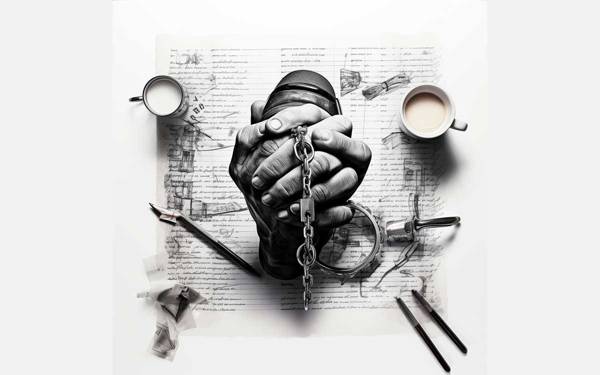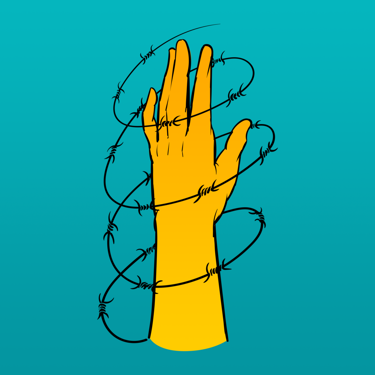BİA MEDIA MONITORING REPORT
The era of 'judicial control' confinement and torture in journalism
In Turkey, where there is no longer any claim regarding fundamental rights within the European Union and domestically, the government continues to instrumentalize the judiciary in line with its objectives. Moreover, it persists in discrediting the Constitutional Court, which it finds 'seriously uncomfortable' after its decisions on online censorship, and aims to blunt its powers.
The BIA Media Observation Report covering January - February - March also indicates that despite the widespread judicial harassment against journalism, although the Constitutional Court's decisions on freedom of expression come late, it still remains as the sole guarantor of justice, despite squandering significant opportunities to annul strategic regulations like "Dissemination of Misleading Information" (Disinformation).
According to the report, at least 195 journalists have been tried under the Anti-Terror Law and Turkish Penal Code, with 14 of them sentenced to a total of 25 years and 7 months in prison. The government coalition continues to threaten journalists in public and use online censorship to the fullest extent. It's noteworthy that in the past three months, the cycle of journalist arrests has primarily targeted local journalists, with dozens of journalists being subjected to judicial control, effectively another form of imprisonment. Additionally, there is a significant increase in complaints of torture and humiliating treatment against media representatives, as seen in examples such as bianet reporters Tuğçe Yılmaz, Aren Yıldırım, and Ali Dinç, along with AFP video journalist Eylül Deniz Yaşar.
During this period, the most serious warning to Turkish authorities came from the Council of Europe Commissioner for Human Rights, Dunja Mijatović, with her published Memorandum. Mijatović stated in her report, "Numerous criminal investigations, prosecutions, arrests, and convictions faced by human rights defenders and journalists in Turkey indicate a widespread practice of abusing judicial processes to silence human rights defenders and obstruct civil society activism."
After Kurdish media, it's now the turn of local journalists to be arrested!
Turkey, which ranked among the "fastest countries in the world in the cycle of journalist arrests" in the RSF Scorecard last year, has continued this unfortunate trend in the past three months as well. While Tolga Şardan, Barış Pehlivan, Elif Akkuş, Batuhan Çolak, and Merdan Yanardağ were released in the last three months of 2023, Süleyman Gençel from Izmir, İdris Özyol from Antalya, and Diren Keser from Mersin were imprisoned in the first three months of 2024.
195 defendants, 14 convictions, 18 acquittals
In January - March, at least 195 journalists faced court for charges such as "membership in a terrorist organization," "spreading propaganda for a terrorist organization," "insulting the President," "disseminating misleading information publicly," "insulting a public official," "defamation," "insulting state institutions," and "violating the Law on Meetings and Demonstrations." Additionally, six journalists were being tried in lawsuits totaling 2.9 million liras in compensation. During the trials in January - March, six journalists were sentenced to a total of 21 years and 10 months in prison for charges like "aiding a terrorist organization," "spreading propaganda for a terrorist organization," and "targeting those fighting against terrorism." Six other journalists were sentenced to a total of 1 year, 9 months, and 20 days in prison and a fine of 22,160 liras for charges of "insulting a public official" and "defamation," while two journalists were sentenced to a total of 1 year, 11 months, and 10 days in prison for "insulting the President." The total duration of imprisonment for the 14 journalists during this period amounted to 25 years and 7 months. Eighteen journalists were acquitted in the criminal cases.
Arbitrary police intervention now includes "torture"
At least 11 journalists were detained during January - March. Five of them were detained in Izmir on suspicion of "membership in a terrorist organization," while three were detained in Van on suspicion of "providing financing to a terrorist organization." During these procedures, incidents of degrading treatment and torture, such as the use of "reverse handcuffs," which has become common in recent years, were observed. One incident that drew attention was when a police officer said to AFP video journalist Eylül Deniz Yaşar, who was detained while covering the Newroz celebrations in Yenikapı, "Pray that we don't turn you into soap like the Jews..."
During this three-month period, at least two journalists and two media outlets were targeted in attacks, and five were threatened. For instance, bianet reporters Tuğçe Yılmaz and Ali Dinç, who wanted to cover the Newroz celebrations in Yenikapı, Istanbul, were attacked by police preventing them from filming. On Election Day, two groups clashed with firearms in Diyarbakır's Sur district, targeting Anadolu Agency and Demirören Agency teams. Fortunately, the journalists escaped the attacks unharmed.
High-ranking officials also present in threatening circles
President Erdoğan warned A Haber channel reporter Rüya Akkuş to "wake up" when faced with questions about the possibility of an alliance with the Refah Party before the local elections. Presidential Chief Advisor Oktay Saral also stated, regarding journalist Fatih Altaylı's criticism of religious structures before the local elections in a YouTube broadcast, "... action must be taken without delay against this apostate heretic. This vile person, who roams this country disguised as a Muslim, must be caught and subjected to the severest punishment as an agent." BirGün newspaper reporter İsmail Arı was threatened due to his coverage and book on the Menzil sect.
“Insulting the President”
20 journalists faced charges of "insulting the President" in the last three months, resulting in cases against them. Names such as Uğur Koç, Furkan Karabay, İhsan Çaralan, İnan Kızılkaya, Sedef Kabaş, Mustafa Sönmez, Barış Pehlivan, Ozan Alper Yurtoğlu, Julien Serignac, Gerard Biard, Laurent Sourisseau, "Alice", Rüstem Batum, Baransel Ağca, Ramazan Yurttapan, Haydar Ergül, Ahmet Sever, Deniz Yücel, Hayko Bağdat, and Erk Acarer were involved in these cases, all based on the grounds of "insulting the President." The total requested prison sentence from these cases amounted to 93 years and 4 months.
In the trials held over the past three months, Uğur Koç from BirGün newspaper and journalist/TV commentator Levent Gültekin were sentenced to a deferred imprisonment of 11 months and 20 days. Economist and journalist Mustafa Sönmez, who was also tried during this period, was acquitted in his fifth case of "insulting the President."
Unfortunately, despite the Venice Commission's recommendation to abolish the article on "insulting the President" and the ECtHR's judgment in the Vedat Şorli case in October 2021, trials based on this charge continue. Since Erdogan became President in August 2014, the number of journalists convicted of imprisonment or fines has reached 76.
Online censorship at the service of the government!
During January - March 2024, censorship was arbitrarily used to silence online journalism under the pretext of "violating personal rights." Unfortunately, this opportunistic censorship persisted even after the Constitutional Court's ruling on the violation.
Despite the Constitutional Court's decision to suspend Article 9 of the Internet Law on October 10, 2024, due to its infringement of personal rights, the Peace Criminal Judgeships and the Association of Access Providers continued to impose access bans on new applications with the approach of "we have time until October 10." Even after the Constitutional Court's decision, at least 41 pieces of journalistic content were blocked or removed due to "personal rights" reasons.
The first three months of the year also saw applications of the charge of "personal rights" as a means to protect criticism or allegations against President Erdoğan's family circle, former or current members of the Justice and Development Party (AKP), party officials, ministry officials affiliated with the party, or party municipal candidates.
The Constitutional Court gave way to "Disinformation"!
In the past three months, the Constitutional Court, which President Erdogan and his ally, MHP leader Devlet Bahçeli, found "seriously uncomfortable," made significant decisions regarding the 5651 Internet Law, under which government circles and the powerful wield heavy-handed online censorship. The Constitutional Court also announced that it would repeal the article on "personal rights" as of October 10; however, opportunistic censorship regarding online content persists.
In the past three months, the Constitutional Court has also continued to accept new applications in areas such as the provision allowing the Press Advertisement Institution to impose advertising cessation penalties based on "press ethics principles" and the foreign travel ban imposed on journalist İrfan Uçar.
Unfortunately, just as in the case of "insulting the President," the Constitutional Court missed an opportunity to repeal Article 217/A of the Turkish Penal Code, which pertains to "publicly disseminating misleading information," on November 8, 2023. Before retiring, Constitutional Court President Zühtü Arslan criticized the decision he opposed, stating, "The greatest obstacle to pluralistic thought, which is the foundation of a democratic society, is the monolithic approach."
ECtHR convicts Turkey in ‘Parıldak’ case
In the last three months of last year, the European Court of Human Rights (ECtHR), which ruled that the detention of TRT Turkey News Director Ersin Şanlı violated the European Convention on Human Rights, also ruled in the first three months of 2024 that the detention of Ayşenur Parıldak, a former reporter for Zaman newspaper, was unlawful, ordering Turkey to pay her 22,000 euros in compensation.
42 million liras fine from RTÜK
The Radio and Television Supreme Council (RTÜK) imposed a total of 29 administrative fines and one suspension of broadcasting penalty on TV broadcasters for news and program broadcasts during January, February, and March 2024. The Council imposed a total of 42,172,592 liras in administrative fines on TV broadcasters. During the reporting period, no administrative fines were imposed on radios, totaling 86,179 liras.
The roots of impunity run deep in Turkey
The fact that Oğuz Demir, dubbed the "bomber" in the Uğur Mumcu murder case spanning over 30 years, is still being tried in absentia is a reflection of the government's lack of determination in solving the murder. The case of Beyza Kural, a former reporter for bianet news site, who was detained in a violent and humiliating manner with "reverse handcuffs" during the 2015 Higher Education Council protests, resulted in only three police officers being fined for "violation of working freedom." The ongoing trial regarding the severe beating of Yeniçağ newspaper columnist Yavuz Selim Demirağ in front of his house in Ankara during the 2019 Elections; the symbolic punishment for the heavy assault by Tatvan Mayor Mehmet Emin Geylani's guards on journalist Sinan Aygül, while Aygül was convicted of "insult"; the prosecution of AFP photojournalist Bülent Kılıç, who was subjected to violent treatment during his reverse handcuff detention, and many other cases where police or authorities' names are involved, indicate the entrenched nature of impunity in Turkey.
Two suspects who attempted an armed attack on journalist Yaman Kaya, a journalist and editor-in-chief of Başka Gazete website, on November 13, 2023, will appear before the Bursa Heavy Penal Court on May 8.
10 journalists unemployed in three months
During January - March, at least 10 media employees were either laid off or forced to leave their jobs due to disagreements arising from the editorial line of the media organization. This figure was also 10 during the same period last year. (EÖ/VK)
BİA MEDIA MONITORING REPORT 2024
The government made journalists' lives a living hell in 2024
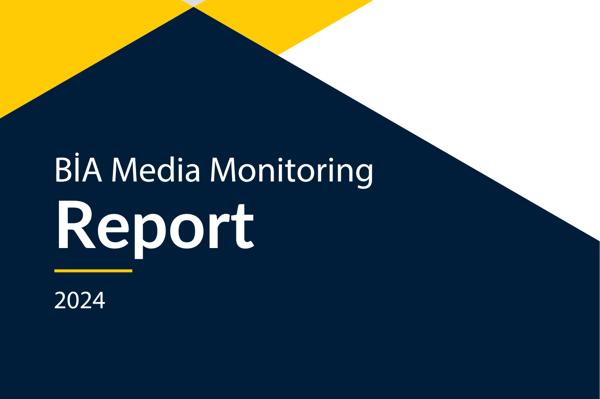
BİA MEDIA MONITORING/OCTOBER-NOVEMBER-DECEMBER 2024
Truth concealed through repression from all sides targeting journalists
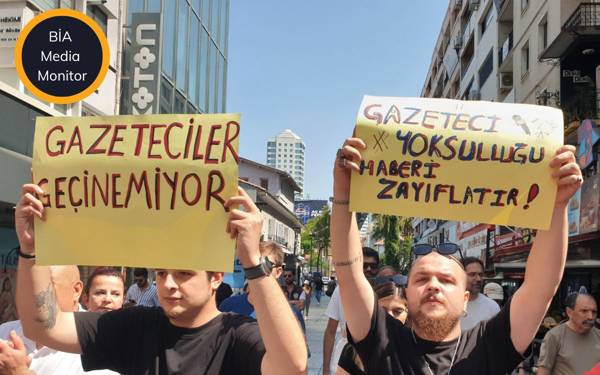
BİA MEDIA MONITORING REPORT
Just silence the journalist, and I won't touch you!
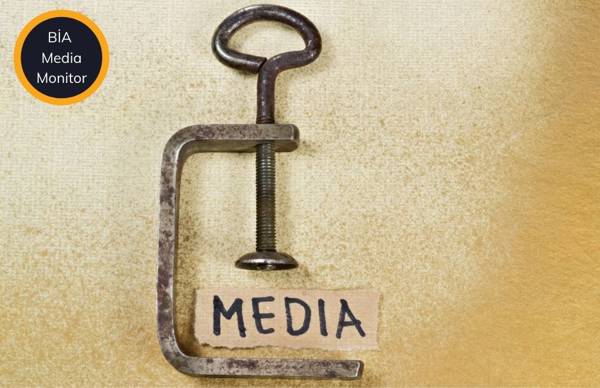
BİA MEDIA MONITORING APRIL-MAY-JUNE 2024
Journalists are on the target and have no legal security anymore!
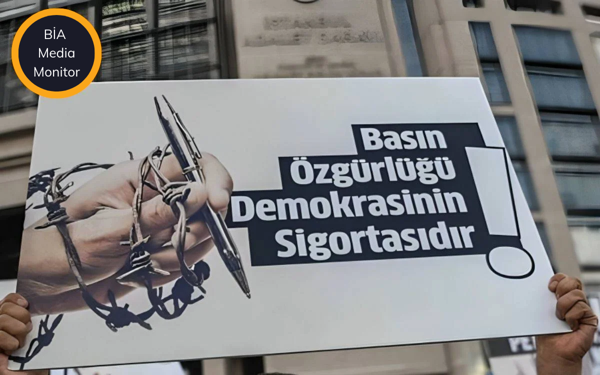
BİA MEDIA MONITORING / JULY-AUGUST-SEPTEMBER 2023
Desire to silence journalists to conceal crimes
